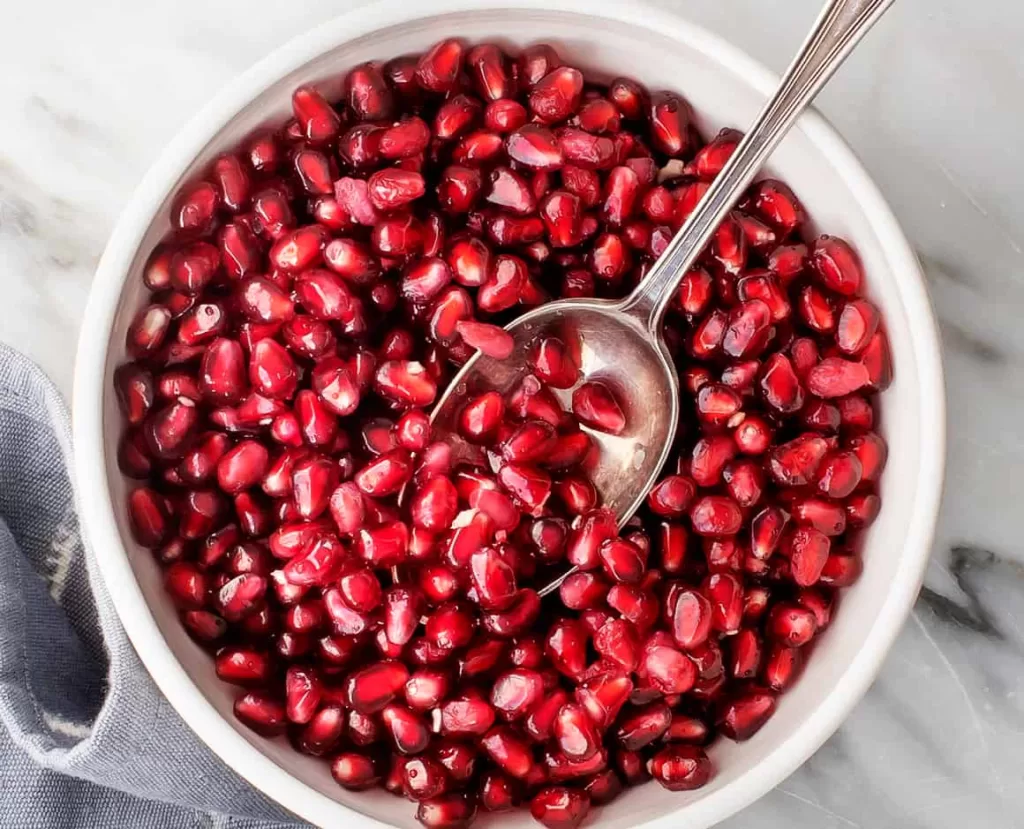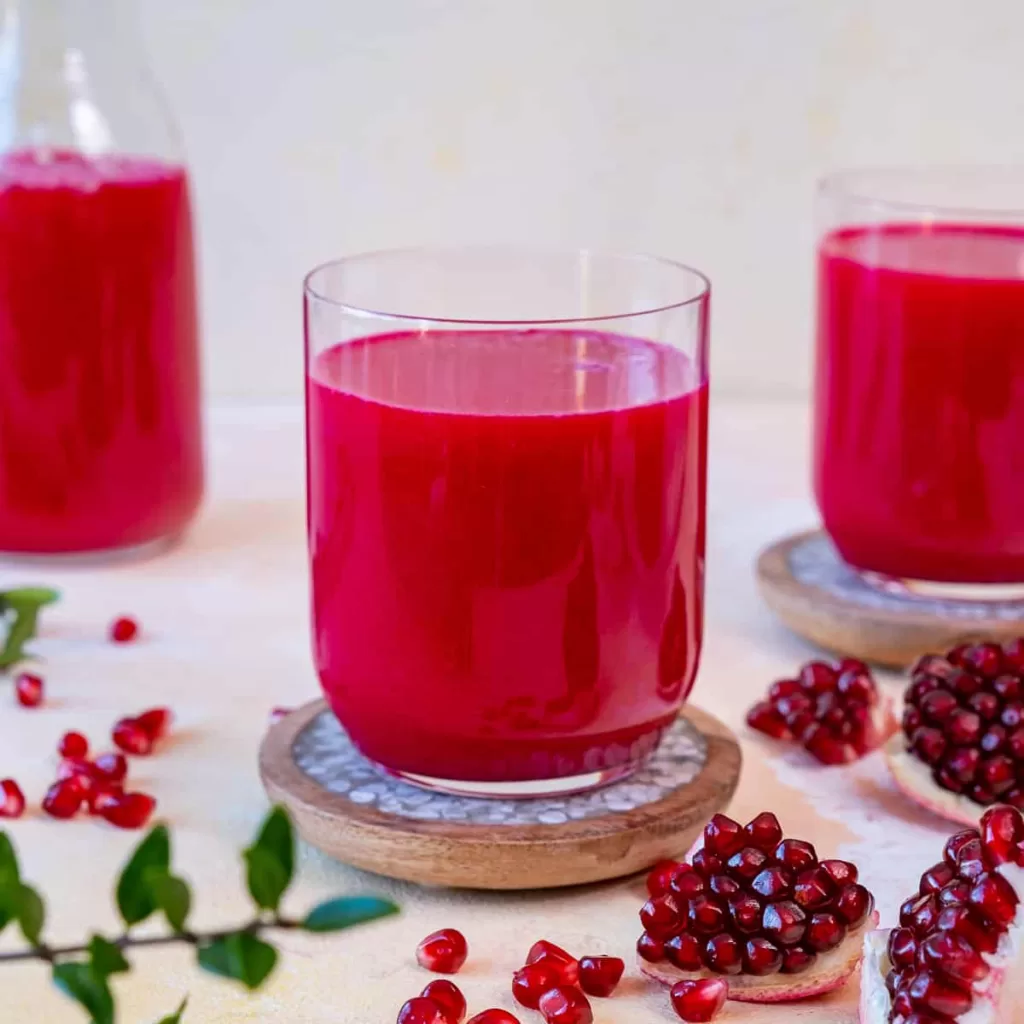The pomegranate, known scientifically as Punica granatum, is a fruit native to the Middle East and Mediterranean regions, with a history that dates back thousands of years. The pomegranate has played a significant role in the cultural, religious, and medicinal practices of many ancient civilizations, including Persia, Greece, and Egypt.
The earliest evidence of pomegranates being cultivated and consumed dates back to ancient Persia, where the fruit was highly regarded for its medicinal properties. The ancient Egyptians also held the pomegranate in high esteem, and the fruit was frequently depicted in their art, literature, and religious rituals.

Brief History
The pomegranate also features prominently in Greek mythology, with the goddess Persephone being said to have eaten a single pomegranate seed while in the underworld, leading to her annual return to the underworld for six months of the year. The fruit was also associated with fertility and abundance in ancient Greek culture.
As trade routes opened up in the ancient world, pomegranate became increasingly popular in other regions, including Europe, Asia, and Africa. It was introduced to China during the Tang dynasty (618-907 AD) and became a symbol of wealth and good luck.
During the medieval period, the pomegranate continued to be highly valued for its medicinal properties and was also used as a symbol of fertility and abundance in Christian art. In the Renaissance, the fruit became a popular motif in still-life paintings, reflecting its status as a luxury item.
Today, pomegranate is widely cultivated and consumed around the world, with major producers including Iran, India, and Turkey. The fruit is rich in antioxidants, vitamins, and minerals and is believed to have numerous health benefits, including reducing inflammation and improving heart health.
In conclusion, pomegranate has a rich and fascinating history that spans thousands of years and many cultures. From its origins in ancient Persia to its current status as a popular superfood, pomegranate has played an important role in human culture and health for centuries.
The nutrients contents of Pomegranate fruit
Pomegranate is a highly nutritious fruit that is packed with various vitamins, minerals, and antioxidants. Here are some of the key nutrients found in pomegranates:
- Vitamin C: Pomegranates are an excellent source of vitamin C, with a single fruit containing around 40% of the recommended daily intake of this important nutrient. Vitamin C is a powerful antioxidant that helps to boost the immune system and support skin health.
- Fiber: Pomegranates are a good source of dietary fiber, which can help to support digestive health and reduce the risk of chronic diseases such as heart disease and diabetes.
- Potassium: Pomegranates are also a good source of potassium, an essential mineral that helps to regulate blood pressure and support heart health.
- Polyphenols: Pomegranates are rich in polyphenols, a group of antioxidants that are known to have anti-inflammatory and anti-cancer properties. Some of the polyphenols found in pomegranates include ellagic acid, tannins, and anthocyanins.
- Vitamin K: Pomegranates are a good source of vitamin K, a nutrient that is essential for blood clotting and bone health.
- Iron: Pomegranates contain small amounts of iron, which is important for the production of red blood cells and the prevention of anemia.
- Vitamin E: Pomegranates contain vitamin E, another powerful antioxidant that is important for skin health and immune function.
Overall, pomegranates are a highly nutritious fruit that can provide a wide range of health benefits. Whether you eat them fresh, use them in cooking or as a juice, pomegranates are a tasty and healthy addition to any diet.
Pomegranates for Weight Loss
Pomegranates are a delicious and nutritious fruit that can offer several benefits for those looking to lose weight. Here are six reasons why and how pomegranates can be effective for weight loss:
Low in calories:
Pomegranates are low in calories, with one medium-sized fruit containing around 100 calories. This makes them an excellent snack option for people looking to lose weight, as they can help to satisfy hunger cravings without adding excess calories.
High in fiber:
Pomegranates are high in dietary fiber, with one fruit containing around 7 grams of fiber. Fiber helps to promote feelings of fullness and can help to reduce overall calorie intake by reducing appetite.
Contains antioxidants:
Pomegranates contain polyphenols and other antioxidants that can help to reduce inflammation in the body. Chronic inflammation can lead to weight gain and an increased risk of obesity-related diseases.
Boosts metabolism:
Some studies suggest that pomegranate may help to boost metabolism and increase fat burning. This could help to promote weight loss over time.
Regulates blood sugar:
Pomegranates contain compounds that can help to regulate blood sugar levels, which is important for weight loss. Spikes in blood sugar can lead to increased hunger and cravings for unhealthy foods.
Reduces stress:
Pomegranate juice has been shown to have stress-reducing effects in some studies. Stress can lead to weight gain and overeating, so reducing stress levels can be beneficial for weight loss.
To incorporate pomegranates into a weight loss plan, consider adding fruit to salads, smoothies, or as a snack on its own. Pomegranate juice can also be a good option, but be mindful of added sugars in some store-bought varieties. Overall, adding pomegranate to a healthy diet and exercise routine can be a helpful tool for weight loss.
Other health benefits Of pomegranate
Pomegranate is a highly nutritious fruit that has been used for medicinal purposes for centuries. In addition to its potential for weight loss, pomegranate has been shown to offer a wide range of health benefits. Here are some of the most notable health benefits of pomegranates:

Antioxidant properties:
Pomegranate contains high levels of polyphenols, which are antioxidants that help to protect the body against free radicals. Free radicals can damage cells and contribute to the development of chronic diseases such as cancer, heart disease, and Alzheimer’s disease.
Anti-inflammatory effects:
Pomegranate contains compounds that have anti-inflammatory effects. Chronic inflammation is associated with many health problems, including obesity, diabetes, and cancer.
Improved heart health:
Pomegranate has been shown to have several benefits for heart health. It can help to reduce blood pressure, lower LDL cholesterol levels, and improve blood flow to the heart. These effects can help to reduce the risk of heart disease and stroke.
Potential cancer-fighting properties:
Some studies have suggested that pomegranate may have anti-cancer properties. The fruit contains compounds that have been shown to inhibit the growth of cancer cells in test-tube studies.
Improved memory and brain function:
Pomegranate has been shown to improve memory and cognitive function in animal studies. It may also have benefits for people with Alzheimer’s disease, although more research is needed in this area.
Anti-bacterial and anti-viral effects:
Pomegranate has been shown to have anti-bacterial and anti-viral effects. Some studies have suggested that pomegranate may be effective against certain strains of bacteria and viruses, including influenza and herpes.
Improved digestion:
Pomegranate contains fiber, which can help to improve digestion and reduce the risk of constipation. It may also have prebiotic effects, meaning that it can help to promote the growth of beneficial bacteria in the gut.
Skin health benefits:
Pomegranate has been shown to have benefits for skin health. It contains compounds that can help to protect the skin against sun damage and reduce the appearance of wrinkles and fine lines.
Reduced joint pain:
Pomegranate has been shown to have anti-inflammatory effects that may help to reduce joint pain and stiffness in people with arthritis.
Potential benefits for diabetes:
Pomegranate has been shown to have benefits for people with diabetes. It can help to improve insulin sensitivity, reduce inflammation, and lower blood sugar levels.
Overall, pomegranate is a highly nutritious fruit that offers a wide range of health benefits. It can be consumed in a variety of ways, including as juice, fresh fruit, or in supplement form. If you are considering adding pomegranate to your diet, be sure to talk to your doctor or a registered dietitian to determine the best way to incorporate this fruit into your overall nutrition plan.
How to make pomegranate juice
Making pomegranate juice is a simple process that can be done at home with just a few tools and ingredients. Here’s how to make pomegranate juice in detail:
Ingredients:
- Pomegranates
- Water
- Sugar (optional)
Tools:
- Large bowl
- Wooden spoon
- Blender or juicer
- Cheesecloth or fine mesh strainer
- Pitcher or container for storing the juice
Instructions:
- Select fresh pomegranates that are heavy and have smooth, unblemished skin. You can also use pre-packaged pomegranate arils, but using whole fruit will provide the freshest flavor.
- Cut the pomegranate in half crosswise. Hold each half over a large bowl, cut the side down, and tap the back with a wooden spoon to release the seeds. The seeds should fall out easily, but you may need to gently pry them out with your fingers.
- Place the pomegranate seeds into a blender or juicer. Add a splash of water to help the seeds blend.
- Pulse or blend the seeds on low speed for a few seconds at a time, until the juice is released and the seeds are broken down. Be careful not to over-blend, as this can release bitter compounds from the seeds.
- Pour the juice through a fine mesh strainer or cheesecloth into a pitcher or container. Use a spoon to press the pulp against the strainer to extract as much juice as possible.
- If desired, add a small amount of sugar to taste. Stir well to combine.
- Chill the juice in the refrigerator for at least an hour before serving. Pomegranate juice can also be stored in an airtight container in the refrigerator for up to one week.
Tips:
- Wear an apron or old clothes while working with pomegranates, as the juice can stain.
- To extract more juice, you can freeze the pomegranate seeds for a few hours before blending.
- You can also use a citrus juicer or manual press to extract juice from the pomegranate seeds.
- For sweeter juice, you can add honey or maple syrup instead of sugar.
- Pomegranate juice can be used as a base for cocktails, smoothies, or other drinks. It can also be added to marinades or dressings for a tangy flavor.

Conclusion
Pomegranates are highly nutritious fruit that offers a wide range of health benefits. They are packed with antioxidants, vitamins, and minerals that can help reduce inflammation, protect against chronic diseases, and promote overall health and well-being.
One of the most significant benefits of pomegranates is their potential to aid in weight loss. They are low in calories, high in fiber, and contain compounds that can boost metabolism and reduce appetite. Regular consumption of pomegranates or pomegranate juice as part of a healthy diet and lifestyle may help with weight management and improve overall health markers.
It’s important to note that while pomegranates can be a helpful addition to a weight loss regimen, they should not be relied on as the sole solution for weight loss. A balanced diet and regular exercise are still essential for achieving and maintaining a healthy weight.
Overall, incorporating pomegranates into your diet can have numerous benefits for your health, including weight loss. So, try adding some pomegranate seeds to your morning oatmeal, blending them into a smoothie, or simply enjoying a refreshing glass of homemade pomegranate juice. Your taste buds and your body will thank you!
Disclaimer:
The author’s views are his or her own. The facts and opinions in the article have been taken from various articles and commentaries available in the online media and Eastside Writers does not take any responsibility or obligation for them.
Note: Contact our Writers at www.eastsidewriters.com for writing Blogs/Articles on any niche. We have experts in various domains from Technology to Finance and from Spirituality to Lifestyle and Entertainment.






